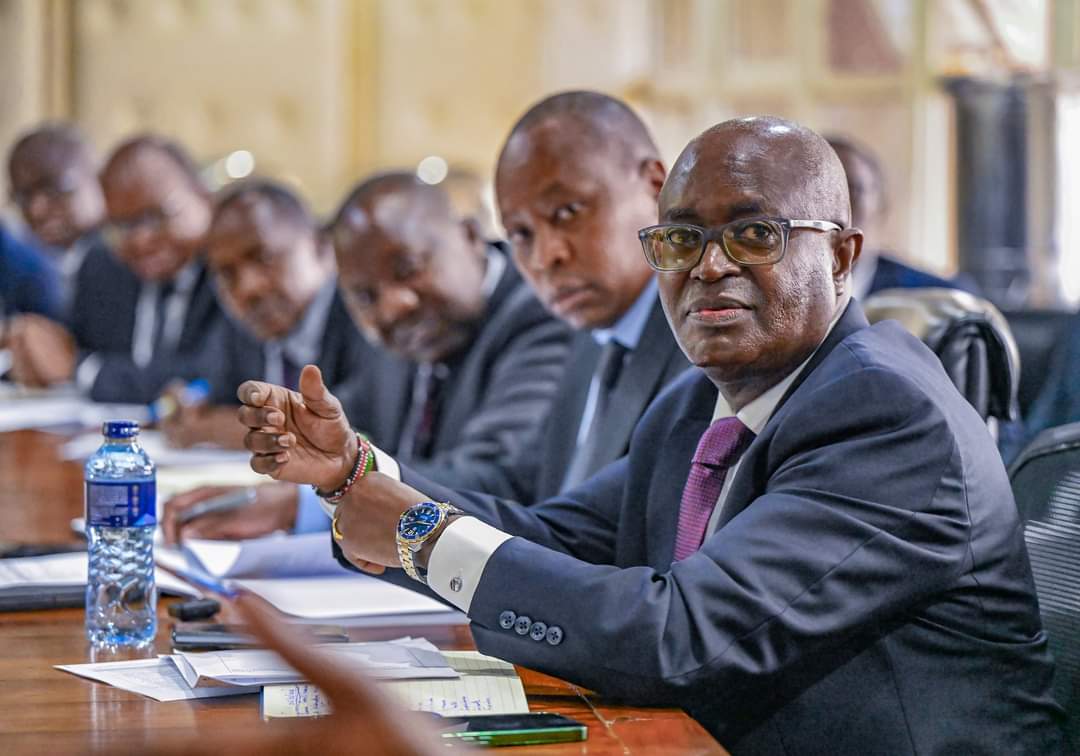News
Petition Seeks To Kick KURA CEO Silas Kinoti Out Of Office Over Tender Scam

An activist has moved to court in a bid to compel the Kenya Urban Roads Authority (KURA) boss Silas Kinoti removed from office over claims of procurement irregularities.
Ezekiel Oyugi claims that the KURA chief executive officer over alleged irregularities in the procurement of three road projects at a cost of Sh13.2 billion.
High Court judge Chacha Mwita directed him to serve Kinoti with the court documents, ahead of the hearing on June 27.
The activist wants the court to declare Kinoti unfit to hold a public office and should bear the cost of the petition.
“A declaration that, as pleaded, the Respondent impugned actions and omissions contravened Articles 1, 2, 3(1), 4(2), 10, 24, 27, 28, 29(a) & (f), 30(a) & (b), 40,47(1), 73, 75, 232(e) & (f), and 259(1) of the Constitution of Kenya, 2010,” he seeks in his petition.
He says Kinoti and EACC violated the obligations imposed on them by Chapter Six of the Constitution, specifically Articles 73(1) & 2(b to e), and 75(1) of the Constitution.
The alleged projects are the establishment of bus rapid transit line, which was done at a cost of Sh6.5 billion.
Oyugi is also accusing the KURA boss over the Nairobi transportation system establishment and junctions’ improvement project phase 1, which cost the taxpayers Sh6.7 billion and also the Nairobi Outering Road improvement project.
He says KURA irregularly entered into contracts with an international company for consultancy in the establishment of the bus rapid transit line on May 24th 2022 for a period of 39 months and the Nairobi Intelligent transport system establishment and junction’s improvement project phase on May 5th 2022 for a period of 34.5 months.
The Project Financing Agreement was irregular and contrary to Section 60 (1) of the Public Procurement and Asset Disposal Act 2015.
“The delay in commencement of works for the establishment of bus rapid transit line project despite Sh174.9m being set aside for the acquisition of non-financial assets,” he says.
He delayed commencement of works caused low absorption of development partner’s loan.
“Due to public concern, Ngong Road was poorly designed, and the construction of the road stalled to date,” says Oyugi.
Under Article 3(1) of the Constitution of Kenya, the petitioner has an obligation to respect, uphold and defend the Constitution.
He adds that acting under Articles 22 and 258 in his own interest, on behalf of the Somali traders who are too scared to act directly in their own names, and in the public interest, the petitioner can move this court to defend rights and fundamental freedoms in the Bill of Rights and also to defend other provisions of the Constitution.
Among other things, the basic rights guarantee the accountability of all, freedom to act within the law, equality before the law, and freedom of association, including the freedom to make political choices.
He adds that he have a reasonable and legitimate expectation by dint of articles 2(3) and 2(4) that Government and its agencies, departments, and commissions can only act legitimately if they proceed in compliance with the Constitution and don’t contravene it in any way.
Article 10 of the Constitution sets out national values and principles of governance that bind all state officers, state organs, and public officers. All persons are required to apply the national values and principles of governance, including inter alia the rule
He adds that under Chapter Four of the Constitution, various fundamental rights have been declared to belong to all persons in Kenya (Article 19, 20), including inter alia the following:
Kenya Insights allows guest blogging, if you want to be published on Kenya’s most authoritative and accurate blog, have an expose, news TIPS, story angles, human interest stories, drop us an email on [email protected] or via Telegram
-

 Grapevine1 week ago
Grapevine1 week agoAlleged Male Lover Claims His Life Is in Danger, Leaks Screenshots and Private Videos Linking SportPesa CEO Ronald Karauri
-

 Lifestyle2 weeks ago
Lifestyle2 weeks agoThe General’s Fall: From Barracks To Bankruptcy As Illness Ravages Karangi’s Memory And Empire
-

 Grapevine5 days ago
Grapevine5 days agoRussian Man’s Secret Sex Recordings Ignite Fury as Questions Mount Over Consent and Easy Pick-Ups in Nairobi
-

 Investigations2 weeks ago
Investigations2 weeks agoEpstein Files: Sultan bin Sulayem Bragged on His Closeness to President Uhuru Then His Firm DP World Controversially Won Port Construction in Kenya, Tanzania
-

 Investigations2 days ago
Investigations2 days agoMulti-Million Dollar Fraud: Three Kenyans Face US Extradition in Massive Cybercrime Conspiracy
-

 Investigations2 weeks ago
Investigations2 weeks agoEpstein’s Girlfriend Ghislaine Maxwell Frequently Visited Kenya As Files Reveal Local Secret Links With The Underage Sex Trafficking Ring
-

 News2 weeks ago
News2 weeks agoState Agency Exposes Five Top Names Linked To Poor Building Approvals In Nairobi, Recommends Dismissal After City Hall Probe
-

 Business1 week ago
Business1 week agoM-Gas Pursues Carbon Credit Billions as Koko Networks Wreckage Exposes Market’s Dark Underbelly















